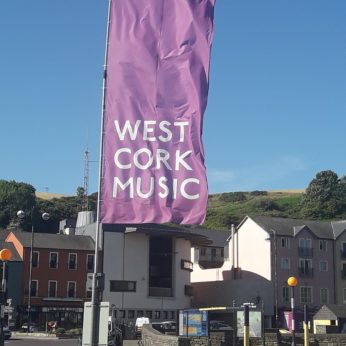Composer: Fanny Mendelssohn (b. 1805 - d. 1847)
Performance date: 28/06/2019
Venue: Bantry Library
Composition Year: 1834
Duration: 00:21:12
Recording Engineer: Ciaran Cullen, RTÉ
Instrumentation: 2vn, va, vc
Instrumentation Category:String Quartet
Artists:
Quatuor Zaïde (David Haroutunian [violin], Leslie Boulin Raulet [violin] Sarah Chenaf [viola] Juliette Salmona [cello]) -
[quartet]

Fanny Mendelssohn [1805-1847]
String Quartet in E flat [1834]
• Adagio ma non troppo
• Allegretto
• Romanze
• Allegro molto vivace
Fanny Mendelssohn composed her only string quartet in 1834. It was first published in 1988. These astonishing facts arise from the intersection of patriarchy, anti-Semitism and class prejudice while she was alive and 140 years of misogyny and collective amnesia after she had died.
The Mendelssohn family had converted from Judaism to Christianity. They wished to establish a secure position in upper-class society in Berlin. In those days upper class young women did not perform, conduct or publish their own work. It was regarded as important, by her father and later by her brother Felix, that Fanny did not violate these conventions. Nevertheless, Fanny Mendelssohn composed over 450 works of music. She played the piano and conducted in private musical salons at the Mendelssohn family home. Her supreme musical talents were recognized by everyone who knew her.
Critics have been quick to point out that there are strong Beethoven influences in this quartet. Beethoven had died in 1827 and Mendelssohn was familiar with all his quartets. During the era following Beethoven’s death and arguably for the rest of the century, a number of the greatest German composers struggled to free themselves from his influence and develop their own voice in the string quartet. What is astonishing about Mendelssohn’s quartet is not the influence of Beethoven (which is of course there) but how she succeeds in finding a confident and original voice of her own.
The tempo scheme of the four movements (slow, quick, slow, quick) is most unusual in the classical quartet. All four movements are harmonically and thematically linked. The most obvious of these is a declining pattern of notes that appears in different forms throughout the quartet. When you first hear the harmonically ambiguous opening chords of the first movement, you might suppose that this was a conventional slow introduction. You would be wrong. When Beethoven used a similar device in the opening of his so-called Harp Quartet, the postponed harmonic resolution was designed to prepare for the introduction of the Allegro which follows. Here Mendelssohn extends the lack of harmonic resolution for sixty bars. The music reaches a passionate climax full of yearning and even anger. When the home key (E flat) is finally reached, there follows a bar of silence to mark the occasion before a gentle coda completes the movement.
The second movement is a Scherzo in C minor (Felix approved you will be relieved to know). The Scherzo itself manages to be both jolly and slightly sinister. The viola then takes the lead into an astonishing Trio. This begins as a fugue, but soon moves into a much freer but still highly contrapuntal development. The heart of the Quartet lies in the glorious third movement. It begins with a poignant tune based on five repeated notes. These five notes will dominate the movement. In the second group of themes, the most important is a declining cascade of semiquavers. This is developed together with the opening figure to reach a powerful and disturbing climax.
The Finale is a joyful sonata-form rondo. It is based on a similar declining cascade of notes but here played at a completely different tempo and time signature. The two violins play the cascade in thirds. After two bars, the viola and cello join in to add to the fun. This is a movement of wonderful exuberance which triumphantly concludes this remarkable quartet. The leading English language Mendelssohn scholar wrote in 2010 that this quartet now stands among the very first significant examples of the genre by a woman. I think we can do better than that. It is, quite simply, one of the finest quartets of its era.
– David Winter
Copyright © 2025 West Cork Music. All rights reserved.
Designed and developed by Matrix Internet